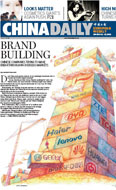Technology
Cell phones expose younger Chinese children to Internet: survey
Updated: 2011-03-01 16:13
(Xinhua)
BEIJING - As cell phones provide a more convenient and inconspicuous alternative to net surfing, Chinese minors are obtaining access to the Internet at a much younger age, triggering concerns about their healthy development, according to a recent survey.
The survey, released Monday and focusing on Chinese minors' use of mobile phones and the Internet, documented how nearly 60 percent of the respondents got access to the Internet for the first time when they were below 10 years old.
The survey, which lasted more than half a year, was conducted mainly among students aged between 10 and 18 years in 106 middle and elementary schools across the country. Some parents and teachers also participated in the survey.
Further, some 1.9 percent had contact with the Internet at or below 3 years old. This small fraction of Internet experiences usually resulted from being alongside with their net surfing parents, most of whom are of the 80's generation. But the survey warned that such passive net surfing experiences might gradually lead to children's active Internet use.
| ||||
The results show that most of the children use cell phones to chat, read blogs, play games and search for information on the Internet.
The survey urged special attention to young children's use of the Internet as cell phones are enabling them to log onto the Internet anytime, anywhere, and it's more likely for them to do so without the notice of their guardians -- compared with using a computer. All these factors make them more likely to find harmful information, the survey warned.
The survey was jointly conducted by the Chinese Young Pioneers Business Development Center and the Chinese Academy of Social Sciences.
E-paper

Factory fever
Despite auto manufacturing bubble scare, car giants gear up expansion of factories.
Preview of the coming issue
Dressed for success
Fabric of change
Specials

Earthquake Hits Japan
A massive 8.8 magnitude quake hit the northeast coast of Japan on March 11,2011.

NPC & CPPCC sessions
Lawmakers and political advisers gather in Beijing to discuss major issues.

Slide: Japan quake
Devastating earthquake and tsunami left millions without water, electricity, homes or heat.



